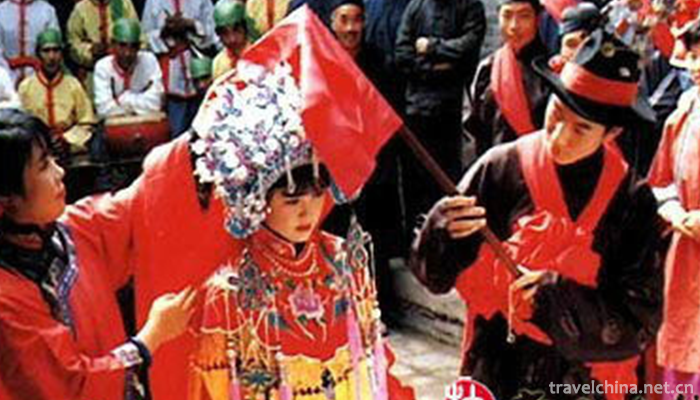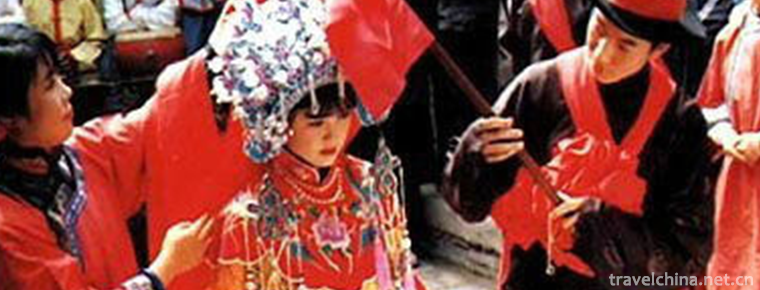Changshan Cheerful Ballads
Changshan Cheerful Ballads
In Changshan, the custom of applauding when marrying and bridging a new house has been popular among the people since ancient times for the sake of luck. The content of applause for marriage and Shangliang is different, each has its own characteristics, forming a folk song with regional characteristics.
On November 11, 2014, Changshan acclaimed ballads were approved by the State Council to be included in the fourth batch of national intangible cultural heritage lists.
Historical evolution
Changshan's applause ballads have a history of more than 400 years and have also spread to Jiangxi and other places. At present, it has more than 1000 color words. Successfully selected the fourth batch of national intangible cultural heritage representative projects in 2014. The selected "Changshan Applause Ballads" belongs to the "Folk Literature" project, numbered I-155.
Characteristics of Ballads
Changshan belongs to the immigrant area, although there are some differences between the townships and townships, they all have common points: first, the applauders are the local high-esteemed people; second, the last word of the sentence before and after the applause ballad is basically rhymed; third, the number of words before and after the sentence is the same, the rhythm is strong; fourth, the applauders and the people who watch lively echo each other, often leading the crowd and the atmosphere is warm.
Changshan applause ballads express the local people's desire for a happy and beautiful life, and have a certain mass base. Applause and songs are all in Lishi dialect, such as when the wedding greets the bride before entering the hall, singing: sunrise East sunrise, happy family; relatives and friends to congratulate, one by one invited to Baxiantai.
Ballad biography
As a kind of folk literature, Changshan applause ballads are inherited from the people's mouths and ears, and do not need any tools. But there are still many rumors about applause:
Zeng Xiangtai collected and collated a pamphlet of applause, named "Applause - Fuxi, OK!" 》 Changshan County Applause Ballads compiled by Changshan County Non-Heritage Protection Center; Changshan Folk Customs Collection - Applause Ballads compiled by Changshan County Committee of CPPCC; Non-Heritage Collection and Folk Customs Grand View compiled by Changshan Historical and Cultural Series Compilation Committee; Zeng Xiangtai's second son, Zeng Ling Jun's folk applause custom.
Inheritance and development
At present, the main inheritor of Changshan applause songs is Zeng Lingbing, 49 years old. Zeng Lingbing was born in an ordinary carpenter's house in Zhaoxian Town, but this ordinary family is the inheritance family of Changshan applause songs. In the pedigree of inheritors, Changshan applause ballads have gone through a century of wind and frost, one continuous line, never interrupted. The first generation of descendants has no trace because of their age. The second generation of descendants is his father Zeng Xiangtai's grandmother and grandfather (born in 1898 in Jiaqing) and Zeng Lingbing. There are six generations of inheritance of Changshan's applause ballads.


-
1.Royal Prime Ministers Palace
Huangcheng Xiangfu (National AAAAA Scenic Area) is located in Beiliu Town, Yangcheng County, Jincheng City, Shanxi Province.
Time 2018-11-24 -
2.Traditional Chinese Medicine Culture
Traditional Chinese medicine (TCM) is the oldest and most complete medical system in the world. It is not only a method of treating diseases, but also a complete philosophy of the universe and life.
Time 2019-04-22 -
3.Huian womens clothing
Hui'an women refer to a group of special folk women on the coast of Huidong Peninsula, Hui'an County, Quanzhou, Fujian Province. They are famous at home and abroad for their unique clothes and diligen
Time 2019-05-04 -
4.Huian stone carving
Hui'an stone sculpture mainly served religion in its early stage, with strong religious color. It is mainly embodied in the architectural design, sculpture and installation of the temple,
Time 2019-05-05 -
5.Oral skills
Oral skill is an excellent folk performing skill and a kind of acrobatics. Originated in ancient times, people used to hunt, imitate the sound of animals, to deceive prey for food. According
Time 2019-05-10 -
6.Production Techniques of Lhasa Jiami Water Mill
Jiami Water Mill was built in the 17th century A.D. It shows the outstanding ability of Tibetan people in mechanical manufacturing and grain processing. It makes full use of natural spring water to gr
Time 2019-05-10 -
7.Drum and percussion music in Southwest Shandong
Southwest Shandong drum music is a kind of traditional folk instrumental music in Shandong Province. It takes Jiaxiang drum music as a typical representative and mainly distributes in Jining, Zaozhuan
Time 2019-05-15 -
8.a kind of Shanxi opera
Shangdang Bangzi is one of the four Bangzi in Shanxi Province. It is popular in the two cities of Shanxi Province, namely, the Minister of southeastern Shanxi Province and Jincheng City (formerly know
Time 2019-06-13 -
9.Uygur Mulberry Paper Making Skills
Uygur mulberry paper takes mulberry branch endothelium as raw material, mulberry branch endothelium is sticky, smooth and delicate, easy to process, after exploitation, soaking, pot boiling, pounding,
Time 2019-06-28 -
10.Yao embroidery
Yao embroidery is exquisite and delicate. Women practice flower-picking at the age of 6-7. When he grew up, he became a master of embroidery. Yao embroidery patterns are mainly used to represent trees
Time 2019-07-11 -
11.Left power blossoms
The style of Zuoquan folk songs began to take shape in Sui Dynasty. In 1930s, Zuoquan flowering tune was derived from Zuoquan folk songs. Zuo Quan's blooming tunes are exquisite in conception, novel i
Time 2019-08-16 -
12.Guang fan Lu
Bian Guang fan, Zi Yi, was born in the first year of Tang Zhaozong's Tianfu (901 years). Emperor Taizu of Song Kai Po six years (973 years), and the state of Yangqu (now Shanxi Taiyuan Yangqu), he has
Time 2019-09-14